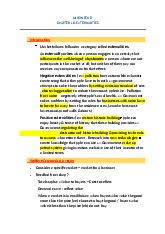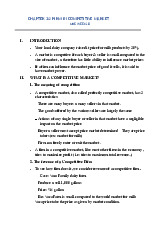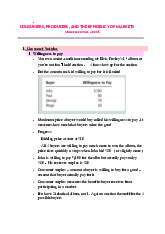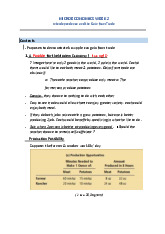



Preview text:
lOMoAR cPSD| 59114765 MICROECONOMICS Week 1 Email: huongntd@hanu.edu.vn Sdt: 0913088883 *Assessment
Attendance 10% , mid terM, 4-% , final term 50%
*Eligibiliity for final term 80% attendance
*** Why to study microeconomics?
- To help understand the world
- To participate more astutely in the economy: give a new perspective on
how best to makr decisions of common things in life.
- Better understand both the potential and limits of economics policy will
help to choose the policies that guide the allocation of society’s resources. ***Overview
- Society has limited resources
- It cannot produce all the goods n services pple wish to have. A person
cannot get everything he wants.
- Resources commonly allocated through combined actions
- Economists study: how pple make decisions; how pple interact; forces
n trends that affects the society as a whole.
TEN PRINCIPLES OF ECONOMICS – Chapter 1
A:How pple make decisions 1. Pple face trade-offs:
+ to get one thing that we like, we usualuy have to give up another thing that we like
+ make decisions require trading off, 1 goal against another. ( Ex;
between “ gun n butter”, between “ a clean environment “n “ a high level of income” lOMoAR cPSD| 59114765
+ trade-off between effiency and equality ( efficiency: cut the
econnomic pie as much as possible , equality: divide )
These 2 goals often conflict when designing policies ( ex: individual tax )
High earner pay higher tax- reduce reward for working hard
pple work less, produce fewer goods n services.
2. The cost of sth is what you give up to get it
Because pple face trade-offs, making decions requires comparing the
costs and benefits of the alternatives.
- The opportunity cost of an item is what you give up to get that item.
3. Rational pple think at the Margin
- Economists normally assume that ppl are rational
- Rational pple systematically and purposely do the best they can to achieve their objectives. - Marginal change:
+ “margin”: means the “edge”
+ Marginal changes are adjustments around the edges of what you are doing
- Rational pple often make decions by comparing marginal benefits and marginal costs.
4. People respond to incentives
- Because rational pple make decions by comparing costs n benefits, they respond to incentives
- Incentives is sthh that induces a person to act, such as the prospect of a punishment or a reward.
- Public policy makers should never forget about incentives : changes in
policies make changes in costs n benefits, thus, alter their behavior. B. How people interact lOMoAR cPSD| 59114765
5. Trade can make everyone better off
- Trade between 2 countries is not like a sport- 1 side win and the other side
lose- but can make each country better off ( win-win).
- Countries benefit from ability to trade with each other: trade allows
countries to specialize in what they do best & to enjoy a greater variety of goods n services.
6. Market are usually a good way to organize economic activity - In a
market economy, decisions are decentralized to firms & household.
+ Firms decide whom to hire and what to make.
+ Household decide which firm to work and what to buy with their income.
Household and firms interact in the market place, where price & self-
interest guide thehir decisions.
By Adam Smith, the interaction’s as if they are guided by an
“invisible hand” that leads them to desirable market outcome.
7. Governments can sometimes improve market outcomes
- Invisible hand can work its magic only if the government enforces the
rules and maintains the institutions that are key to a market economy.
- -- Market economies need institutions to enforce property rights so
individuals can own and control sarce resource - To promote efficiency or to promore equality
C. How the economy as a whole works
8. A country’s standard of living depends on its ability to produce goods and services
- The growth rate of a nation;s productivity determines the growth of its average income
- The fundemental relationship between productivity and living standard is
simple, but its implications are far-reaching lOMoAR cPSD| 59114765
- The relationship between the productivity ans living standard also has
profound implications for public policy
9. Prices rise when the Government prints too much money
The cause of inflation ( sự lạm phát kinh tế ): Growth in the quantity of money
10. Society faces a short-run trade-off between inflation and unemployment
- Policymakers can exploit the short-run trade-off between inflation and
unemployment using various policy instruments.



